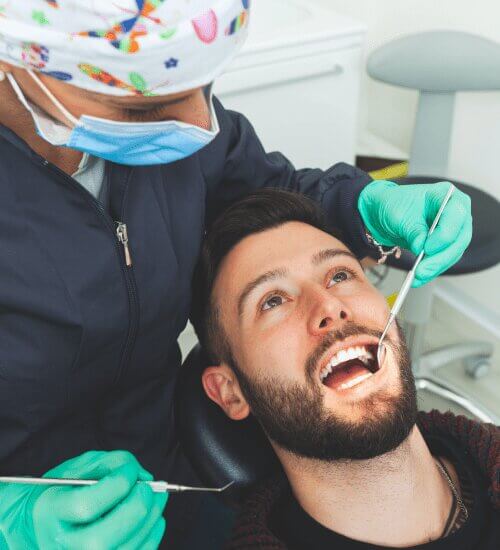
Most of us may not have heard about the temporomandibular joints (TMJ), however they are extremely important, these joints connect your jawbone to your skull. They are in action when we chew, and swallow. TMJ disorders occur when there is an issue with our jaw joints and jaw muscles. This usually happens if there is a jaw injury, inflammation. At our clinic, we understand that TMJ can be extremely painful, this can make daily activities such as talking or chewing excruciatingly painful. We offer effective and reliable TMJ therapy in Red Deer. To know more about our treatments or to book an appointment with us, call us now.
Symptoms Of TMJ:
TMJ disorders can cause mild to serious symptoms, such as:
- Pain while chewing
- Pain in the ear
- Pain in the face, jaw, and neck
- Clicking of jaw
- Popping sounds in the jaw
- Locking of the jaw joint
- Severe headaches
How does our dentist diagnose TMJ?
Our doctors will discuss your symptoms and examine your jaw, we will also
- Feel your jaw when you open and close your mouth
- Observe the range of motion in your jaw
- Check your jaw to identify parts of the jaw that pain
- Dental X-rays to examine your jaw
- CT scan to provide detailed images of your jaw
- MRI to check for joint's disk or surrounding soft tissue
Treatment For TMJ
In some cases, the symptoms of TMJ may go off without any treatments, however it is always recommended that you get the issue treated to avoid unnecessary pain and discomfort in the future. Our dentists will recommend a variety of treatment options based on the severity of the issue.
We offer a number of treatment options such as nonsurgical treatments, these medications will relieve the pain associated with TMJ disorders
- Pain relievers and anti-inflammatories: If you have tried taking over the counter pain relievers and found no relief, we will recommend a stronger painkiller such as ibuprofen.
- Muscle relaxants: These types of drugs help relieve pain caused by TMJ disorders caused by muscle spasms.
- Mouth guards (occlusal appliances): Here, we recommend that patients wear a soft or firm device that is inserted over their teeth, this may offer some relief some the pain.
- Physical therapy: We will recommend exercise to help strengthen jaw muscles.
- Counselling, education: Here our dentist will educate you on the factors and behaviours that may aggravate your pain, this includes teeth clenching or grinding. Our dentist will guide you on how to avoid doing this and reducing pain.
- Counselling, education: Here our dentist will educate you on the factors and behaviours that may aggravate your pain, this includes teeth clenching or grinding. Our dentist will guide you on how to avoid doing this and reducing pain.
Surgical Or Other Procedures
- Arthrocentesis is a minimally invasive procedure. Here we will use small needles and pierce them into the jaws so that fluid can be irrigated through the joint. This will help remove debris and inflammatory byproducts.
- Injections. In some cases, injecting certain medications into the jaw muscles may relieve pain associated with TMJ disorders.
- TMJ arthroscopy. Arthroscopic surgery is effective in treating various types of TMJ disorders.
- Open-joint surgery. If no treatments provide you relief, then we recommend an open-joint surgery (arthrotomy).
Before we recommend a surgery or other procedures, we will provide you all details regarding the benefits and risks associated with it.
Looking for TMJ therapy in Red Deer? Call us now.
